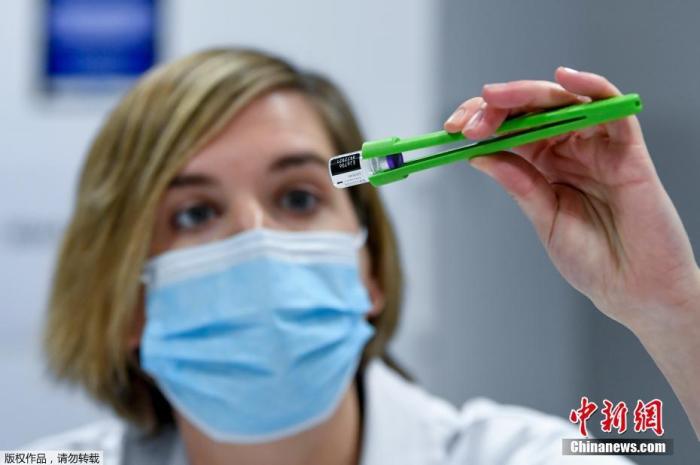China News Service, January 29th, a comprehensive report, recently, the British pharmaceutical company AstraZeneca announced that it will significantly reduce the supply of vaccines to the EU in the first quarter, incurring strong accusations from the EU.
The crisis meeting between the two sides on the 27th also ended in vain.
The AstraZeneca vaccine is expected to be approved by the European Medicines Agency on the 29th.
On December 27, 2020 local time, many member states of the European Union officially launched the new crown vaccination work.
The picture shows Belgian medical staff preparing for the new crown vaccination work.
Sudden reduction of vaccine supply, EU "great flames"
Since AstraZeneca announced on January 22 that it would substantially reduce its supply of vaccines to the European Union in the first quarter, the company's CEO, Suboco, became a target of public criticism in the European Union.
AstraZeneca stated that it could only supply 31 million doses of vaccine to the EU in the first quarter of this year, instead of the 80 million doses previously mentioned.
European Union politicians are "excited" about this.
EU Member of Parliament and health expert Li Jie suggested that if AstraZeneca cannot provide more vaccines as agreed, but "treats EU citizens as second-class citizens," then the EU must take measures, such as banning the export of Pfizer's new crown vaccine to the UK.
The European Commission said that it is considering requiring vaccine manufacturers to apply for export licenses before supplying vaccines to countries outside the EU.
For goods used for humanitarian purposes, the EU will issue and certify.
It is reported that AstraZeneca is also producing the new crown vaccine in the EU and part of it is shipped to the UK.
The German Minister of Health, Spand, said that the purpose of the EU's enhanced export review is to understand which vaccines are exported, and only in this way can we understand whether the contract with the supplier has been executed fairly.
Although the supply to the EU in the first quarter has been greatly reduced, AstraZeneca's supply to the UK will be on time and in quantity, without any decrease.
On December 27, 2020 local time, many member states of the European Union officially launched the new crown vaccination work.
The picture shows Belgian medical staff preparing for the new crown vaccination work.
Different opinions on the content of the agreement
For the EU’s backlash, Subko defended AstraZeneca.
In an interview with several European media, he stated that AstraZeneca only stated in its August 2020 agreement with the European Union that it "does its best" to meet the agreed supply quantity, but did not specify the guarantee of supply.
In addition, the United Kingdom reached a vaccine supply agreement with AstraZeneca two months earlier than the European Union. Therefore, AstraZeneca began to produce vaccines for the United Kingdom earlier.
However, the European Commission said that the EU and AstraZeneca reached an agreement only two weeks later than the UK, and the EU also prepaid 336 million euros in vaccine production funds to obtain 300 million doses of vaccine.
EU Health Commissioner Stella Kyriakides said that Subko's statement is neither true nor acceptable.
She said that the agreement between the European Union and AstraZeneca had a clear quarterly supply schedule, and the agreement included the "best effort" clause because the vaccine had not yet been successfully developed. Once the vaccine is approved, it must Supply the agreed quantity.
The EU hopes that AstraZeneca will agree to a disclosure agreement to increase transparency.
Kyria Kiddes also emphasized that AstraZeneca has ethical, social and contractual responsibilities, "We are in a pandemic and are losing lives every day."
Another focus of the arguments between the two parties is that the EU has the right to obtain vaccines produced by AstraZeneca.
AstraZeneca has a factory in Belgium and another in the EU to produce the new crown vaccine.
Subko said that the reason for the reduction in supply to the EU was the production difficulties encountered in the Belgian factory.
However, the European Commission pointed out that the agreement stipulates that AstraZeneca will not only produce vaccines for the EU at these two plants, but also produce vaccines for the EU at two plants in the UK. AstraZeneca’s UK plant will only produce vaccines for the UK. The agreement was violated.
There is a huge gap between vaccination goals and reality
On January 27, the European Union and AstraZeneca held a crisis meeting.
Although the participants stated that the discussions between the two sides were constructive, the meeting still ended in vain.
People in the European Union pointed out, "We don't want to have a dispute with AstraZeneca. What we want is a vaccine, and we hope to reach a settlement with the company."
The European Medicines Agency is expected to approve the AstraZeneca vaccine on January 29.
The EU has signed a total of more than 2.3 billion doses of vaccine supply agreements with six new crown vaccine manufacturers.
To date, 8.4 million of the EU’s 450 million people have received one or two doses of the vaccine.
At the current rate, it will take more than two years for all EU residents willing to receive two doses of the vaccine.
The EU countries’ goal is to vaccinate 70% of the population by the end of this summer.

